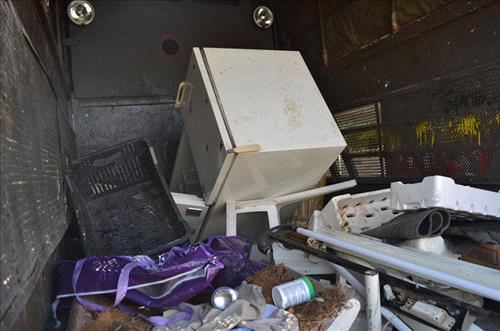Ammon News - AMMONNEWS - Weathered plastic bags cling to desiccated stalks of weeds in a field strewn with empty soda bottles. Spotting something, Salem drops his bag on the sidewalk and dashes into the littered lot.
He returns with two jugs and heavy plastic tubing - valuable finds. As he bends to launch himself over the wall between the lot and sidewalk, his thin sweatshirt stretches taut over sharp shoulder blades.
"The immigrants live better than I do," the 40-year-old Jordanian told Al Jazeera, referring to the influx of Syrian refugees who have poured into Jordan over the past three years.
Salem, who spoke under a pseudonym, has been an unofficial but important player in Jordan's solid waste sector for the past two decades. Scavenging, reclaiming, trash picking - the terminology varies, but the profession exists all over the world, from Egypt to Pakistan to Brazil.
In Jordan, trash pickers barely resemble their counterparts in other countries, where pickers form communities and sometimes earn public recognition. Here, it is usually every trash picker for himself, although very occasionally they work in teams, said Amal Madanat, an environmental activist focused on trash and recycling.
Far from recognising pickers' contributions to waste management, the Jordanian government deems their work illegal. Even those in the recycling business tend to shy away from pickers. One recycling company said it would take large quantities of recyclables from businesses like hotels and restaurants, but it would not coordinate with trash pickers, who pull smaller amounts of recyclables directly from dumpsters.
Jordan, saddled with more than 19 billion Jordanian dinars ($27bn) of debt, is also hosting about 620,000 Syrian refugees, whose presence has created a conundrum: How to support the country's own poor alongside impoverished refugees receiving aid from NGOs and charities. Over 80 percent of Syrian refugees live not in refugee camps but in Jordanian communities, and locals' resentment over sparse resources often festers.
Salah, 40, took up trash picking 17 years ago because his day job paid so little. "I started to go out after work, buying and selling [scrap materials]," he told Al Jazeera. This gradually grew into a full-time occupation, and he eventually saved up enough money to buy a pick-up truck to transport more and larger finds.
In Jordan, household trash and unwanted items are deposited in communal roadside dumpsters. Municipalities are responsible for emptying them, but between rounds by government trucks, trash workers salvage anything of value. Sorting through food scraps and used toilet paper, they collect metals, heavy plastics and wood to sell to scrap traders, or items such as perfume bottles and discarded electronics to sell at local markets.
Salah says his profits range between 5 and 10 dinars ($7 to $14) a day. If he does not work for two days, Salah says he "eats air". He declined to provide his last name, saying his work was "ayb", Arabic for shame.
"When I used to go about on foot, it happened all the time. People would throw eggs at me or shine a laser on me as I walked, right at my eyes," he said.
Some pickers interviewed by Al Jazeera arrived at this line of work after sustaining an injury or disability, while others simply could not find work elsewhere. For all, it was an occupation of last resort.
Mahmoud, 43, began trash picking in 1997. He previously worked as a plumber, but after a bad fall landed him in hospital for five months, he started collecting scrap materials. "If something else [another job] comes along, I would take it," he told Al Jazeera.
A 61-year-old trash picker who declined to provide his name said simply: "There's no other work I can do.
"If I go to restaurants to look for work, they say to me, 'You're an old man. We want young men,'" he said, noting he quit his previous job fixing shoes eight years ago, because fumes from the glue made it hard to breathe.
While some Jordanians resent the aid given to Syrian refugees - including cash assistance from the UN refugee agency and other NGOs - most refugees cannot afford work permits and can only work illegally "under the table". Registered refugees do, however, have access to government services, such as healthcare and education. The Jordanian government estimated it has spent more than $5bn on hosting refugees.
But the refugee crisis is hardly the primary source of economic woes in Jordan, which has long lacked natural resources and has needed economic reform. Official unemployment hit 13 percent last year, a rate that is higher in rural areas and nearly doubles among youth.
"The solution is so complicated and complex that people don't necessarily know what to do about it," said Lisa Depangrazio, who manages a cash assistance programme that gives aid to beneficiaries regardless of nationality for the International Rescue Committee in Jordan.
Jordanians "sometimes fall into the trap of affiliating their difficult economic situation with the influx of Syrians", Depangrazio noted. "When you feel like there's an easy fix or there's a scapegoat, then that's an easy answer."
Musa Shteiwi, director of the Centre for Strategic Studies at the University of Jordan, said that while Syrians may be disproportionately blamed for a lack of jobs, they have indeed contributed to other issues, such as overcrowding in schools and healthcare facilities and rising housing costs.
The refugee crisis "is changing the entire landscape - the social fabric, the economic fabric", he said. Locally, "people feel that they're let down. They don't feel that they're really taken care of".
* Al Jazeera












 comment replay
comment replay 